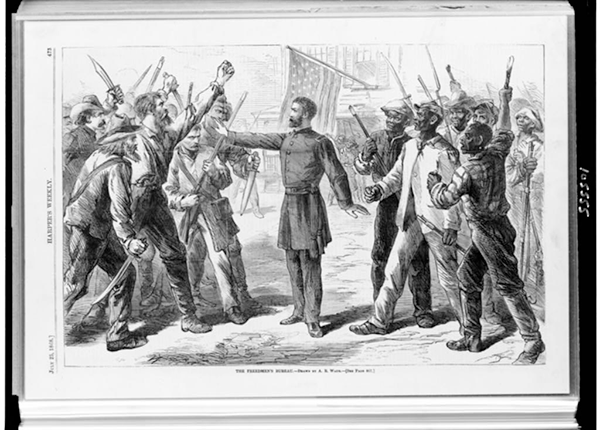Historic Document
Freedmen’s Bureau Bill, “An Act to establish a Bureau for the Relief of Freedmen and Refugees” (1865)
Congress | March 3, 1865

Library of Congress, Prints and Photographs Division
Summary
In 1863, Congress began debating the creation of a federal agency that would have authority to supervise schooling, oversee contractual relationships between former slaves and former owners, and determine whether freed slaves were entitled to ownership of lands abandoned by, or confiscated from, rebel Confederates. The House passed this legislation in 1864, and the Senate approved the bill in the final days of the 38th Congress. Similar actions had already been encouraged by private philanthropic and missionary organizations such as the American Missionary Association, and by Union commanders such as William Tecumseh Sherman, whose Special Field Orders No. 15 of January 15, 1865, set aside over 7,000 square miles of the South Atlantic coastal regions for the granting of “a possessory title” (sometimes described as “forty acres and a mule”) to “blacks now made free by the acts of war and the proclamation of the President." The new legislation created a Bureau of Refugees, Freedmen, and Abandoned Lands (the “Freedmens’ Bureau”), with Major General Oliver Otis Howard serving as its Commissioner until the Bureau’s termination by Congress in 1872. The Bureau bill dramatically expanded federal authority, raised constitutional questions about confiscation, and was bitterly opposed by President Andrew Johnson.
Selected by

Allen C. Guelzo
Director, Initiative on Politics and Statesmanship, James Madison Program in American Ideals and Institutions, Princeton University

Darrell A.H. Miller
Melvin G. Shimm Professor of Law at Duke University School of Law
Document Excerpt
[T]here is hereby established in the War Department…a bureau of refugees, freedmen, and abandoned lands, to which shall be committed, as hereinafter provided, the supervision and management of all abandoned lands, and the control of all subjects relating to refugees and freedmen from rebel states…. The said bureau shall be under the management and control of a commissioner to be appointed by the President, by and with the advice and consent of the Senate.
…And be it further enacted, that the Secretary of War may direct such issues of provisions, clothing, and fuel, as he may deem needful for the immediate and temporary shelter and supply of destitute and suffering refugees and freedmen and their wives and children, under such rules and regulations as he may direct.
…And be it further enacted, That the commissioner, under the direction of the President, shall have authority to set apart, for the use of loyal refugees and freedmen, such tracts of land within the insurrectionary states as shall have been abandoned, or to which the United States shall have acquired title by confiscation or sale, or otherwise, and to every male citizen, whether refugee or freedman, as aforesaid, there shall be assigned not more than forty acres of such land, and the person to whom it was so assigned shall be protected in the use and enjoyment of the land for the term of three years at an annual rent not exceeding six per centum upon the value of such land….
At the end of said term, or at any time during said term, the occupants of any parcels so assigned may purchase the land and receive such title thereto as the United States can convey, upon paying therefor the value of the land, as ascertained and fixed for the purpose of determining the annual rent aforesaid.
Source: The Statutes at Large of the United States of America (Boston, MA: Little, Brown, 1866), 13:507-509




